Stories about...Leon Liebenberg, His Pedagogy, & His Courses
 Liebenberg Espouses Mini-Projects to Engage Students Emotionally, Improve Learning in Engineering
Liebenberg Espouses Mini-Projects to Engage Students Emotionally, Improve Learning in Engineering
May 17, 2021
Mechanical Science and Engineering’s (MechSE) Professor Leon Liebenberg is a proponent of project-based learning—a student-centered pedagogy that suggests students learn better when they have the autonomy to actively explore real-world challenges and problems. So, in two of his lecture courses, ME 200 (Thermodynamics) and ME 400 (Energy Conversion Systems), a key component of both is mini-projects and E-portfolios. Why? He says they engage students emotionally. He goes on to explain the advantages doing so.
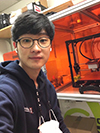 Liebenberg's ME270 Students Repurpose Products for Final Design Project
Liebenberg's ME270 Students Repurpose Products for Final Design Project
December 17, 2020
For students in Leon Liebenberg’s ME 270 (Design for Manufacturability) course, nothing could be more apropos than the old saying, “One man's trash is another man's treasure." For the final mini-project of the semester, the mostly Mechanical Science and Engineering (MechSE) students were to repurpose trash (a discarded product or products) into a product with a non-medical application. So, in an online competition held via Zoom during the final class period on December 8th, the top five projects were presented, after which classmates, the professor and his TAs, and special visitors invited to the session voted for their favorite. The treasure? The top three winners not only received accolades, but students with stellar final projects could contribute significantly to their final grade...and possibly come up with a repurposing design that could somehow make a difference down the road.
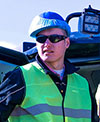 MechSE Seniors Seek to Make Congenital Amputee’s Dream of Operating Cat Heavy Equipment a Reality
MechSE Seniors Seek to Make Congenital Amputee’s Dream of Operating Cat Heavy Equipment a Reality
June 11, 2020
Ever since he was a boy, Dylan Taylor has envisioned a career behind the controls of some really big construction equipment. Now that he’s 18, he still dreams of operating some of the big boys—specifically, Caterpillar’s excavator, bulldozer, and motor grader. However, to achieve this dream, Taylor must first overcome a significant conundrum. Born with a congenital defect, he’s missing his left hand, and most of Cat’s equipment is maneuvered via dual joysticks. So a team of five Mechanical Science and Engineering (MechSE) seniors, in collaboration with Caterpillar, were excited to help Taylor achieve his dream. For their ME 470 senior capstone design project, the soon-to-be-engineers designed several machine control adaptations, which, before too long, will help to make Taylor’s dream a reality.
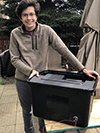 From Trash to Treasure: Liebenberg Uses Design for Repurposing to Spark Student Interest in Online Classes, Possibly Making a Difference in the COVID-19 Pandemic
From Trash to Treasure: Liebenberg Uses Design for Repurposing to Spark Student Interest in Online Classes, Possibly Making a Difference in the COVID-19 Pandemic
May 6, 2020
Can a Coca-Cola bottle be repurposed to make a medical device? What about a plastic bag? How effective are the masks we must now wear when in public? How can masks be reused safely? What are some low-cost solutions for the shortage of ventilators? Leon Liebenberg, a Teaching Associate Professor in Mechanical Science and Engineering (MechSE) was hopeful that students in his ME 270 course might answer some of these questions, even possibly resolve some of the COVID-19-related issues our society is now facing. Liebenberg says, “With everything being turned upside down” (due to the pandemic), he sought a way to help his students more fully engage in online learning. So over spring break, he revamped the final project for his Design for Manufacturability course, making it timely, extremely relevant to the real world, and sure to pique the interest of his students, whom he says are passionate about making a difference. As part of ME270’s “Design-for-Repurposing” final project, students were to design a prototype for emergency medical equipment, such as a ventilator or face mask, using repurposed materials and products..
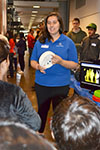 Fall 2019 Illinois Space Day Is Out of This World
Fall 2019 Illinois Space Day Is Out of This World
October 18, 2019
Would you like to blast off on a rocket ship some day to explore outer space? Doubless some of the around 200 people who showed up for Illinois Space Day (ISD) uon October 5th would. Among the 150+ visitors to the event at the Digital Computing Lab were some local teachers, parents, and lots of K–8th grade students—possibly with some future aerospace engineers or maybe even an astronaut or two among them. Also on hand were numerous Illinois Aerospace Engineering students, sporting t-shirts emblazoned with “The 50th anniversary of the Moon Landing!” to celebrate one of Man's most important forrays into space and the theme of the Day: the Apollo 11 mission. The Aerospace students’ goal in participating in the event was to not just share their passion for space with the young visitors, but also to possibly recruit some into aerospace engineering down the road, or to help pique the interest of a future astronaut.
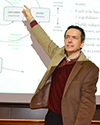 Via ENGINE, a Group of Illinois Educators Promote Using Playful Pedagogies to Engage Students
Via ENGINE, a Group of Illinois Educators Promote Using Playful Pedagogies to Engage Students
April 10, 2019
While Illinois students receive a good education and become highly sought after once they graduate, a group of Illinois faculty and educators believe faculty can do an even better job of engaging students. So a multidisciplinary team of educators with similar goals of improving education are collaborating in a new program called ENGINE: ENGagment In eNgineering Education, whose focus is for not just engineering faculty but all Illinois faculty to move beyond traditional teaching methods to explore a number of engaging new pedagogical strategies. A key objective, along with engaging students, is to share their passion for playful learning with other educators by developing resources then assessing the impact of these new teaching pedagogies to share with other faculty, both on campus and beyond.
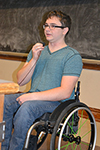 Liebenberg’s ME 270 End-of-Semester Main Project Presentations Showcase Students’ Manufacturability Redesigns
Liebenberg’s ME 270 End-of-Semester Main Project Presentations Showcase Students’ Manufacturability Redesigns
December 18, 2018
On Tuesday, December 11th, the top five teams in MechSE Professor Leon Liebenberg’s ME 270, Design for Manufacturability course presented their final projects before the entire class, as well as special guests, including some both current and emeritus professors and staff who contributed in some way to the students' projects. Attendees then voted on their favorite redesigned product.
The idea behind the course’s main project, Redesign for Manufacturability, was that teams of students were to purchase a product for less than $40 then redesign it so that it was simpler, used fewer parts, was easier to assemble or disassemble, could be made more inexpensively, and/or was easier to recycle. They were to test and evaluate their revised products and report their results in an e-portfolio. The top five teams were selected based on the following criteria: content and creativity, subject knowledge, composition, and contribution.
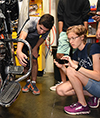 MechSE’s Leon Liebenberg, SIIP Team Use Play-in-Learning Elements to Engage Students, Foster Learning
MechSE’s Leon Liebenberg, SIIP Team Use Play-in-Learning Elements to Engage Students, Foster Learning
September 19, 2018
We’ve all seen toddlers learn about shapes by trying to place a round object into a toy’s square hole, and vice versa. We’ve also seen children learn basic structural engineering principles by building a tall tower of blocks or Legos with insufficient structural support, only to have it crash to the floor. If small children can learn through play, couldn’t much older students, such as undergraduates in Illinois Engineering courses? Leon Liebenberg, a MechSE Professor, and a team of colleagues who are part of his “Play-in-Learning: Cognition, Emotion, and Playful Pedagogy” SIIP proposal all seem to think so. However, Liebenberg reports, “Not everyone is convinced that play belongs in engineering…Some people are cynical or suspicious about the prospective benefits of play in engineering.”
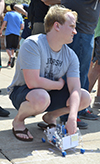 ME370’s Final Competition—March of the Automata—Fosters MechSE Students’ Creativity, Perseverance, and Teamwork
ME370’s Final Competition—March of the Automata—Fosters MechSE Students’ Creativity, Perseverance, and Teamwork
May 11, 2018
It was noon on Wednesday, May 2nd on Engineering Quad, and the hopes and dreams of a group of Mechanical Science and Engineering (MechSE) students were riding on the little robot they’d built for the ME370 projects course final competition: the March of the Automata. Their motivation? If their team’s automaton won the race, they’d not only have bragging rights, but they’d get a bye on the upcoming final exam.













.jpg)
















